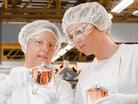L’Oréal's Quality-First Approach To Manufacturing Operations

The global beauty and personal care market is valued at more than US$500bn and is only continuing to grow.
At L’Oréal, a global leader in the beauty industry renowned for its extensive portfolio of brands from Garnier to YSL, the manufacturing of beauty products is driven by the company's commitment to quality and safety.
It ensures each product is manufactured with the finest ingredients, advanced formulations and state-of-the-art production processes.
Every step is designed to uphold L’Oréal’s rigorous standards, guaranteeing that customers worldwide receive products that consistently meet the same high level of excellence.
To achieve this superior quality, L’Oréal has implemented one of the most stringent quality management systems in the manufacturing industry.
This system is applied across all of their global plants and facilities, ensuring that every phase of production, from initial design to market distribution, adheres to the highest standards.
A quality-focused approach
To achieve this quality, L’Oréal, which manufactures over seven billion cosmetic products annually, enforces rigorous standards across its global operations, with in-house requirements surpassing regulatory demands.
Each product undergoes around a hundred quality controls during production, whilst daily quality audits on packaging suppliers and utilise 600 efficacy testing tools to ensure product performance. The company also employs 113 toxicology experts dedicated to product safety.
"Quality is a link between all of us: our teams, external stakeholders, suppliers, distributors and our consumers, of course," comments Eric Wolff, Quality and EHS Director at L’Oréal.
"Everyone has a role to play in the consumer’s satisfaction."
L’Oréal places product safety and quality at the forefront of its manufacturing process, ensuring that customers can trust the safety and effectiveness of every item they use.
This commitment is upheld through rigorous safety protocols and a meticulous approach to ingredient and product evaluation.
The safety evaluation process at L’Oréal involves four key steps:
Ingredient characterisation: Each ingredient is thoroughly assessed for quality, origin, and potential hazards, including allergenicity, creating a detailed identity profile.
Usage condition analysis: L’Oréal carefully analyses how products will be used by consumers, adjusting ingredient dosages accordingly to ensure safety in various contexts, such as ingestion risks with lipsticks versus rinse-off products like shampoo.
Tolerance verification: Extensive in vitro testing on reconstructed skin and clinical trials on humans are conducted to confirm product safety before market release.
Post-marketing surveillance: An international network monitors product safety globally, addressing any potential issues swiftly.
L’Oréal has been a pioneer in ethical beauty, having developed reconstructed skin over 40 years ago to eliminate the need for animal testing.
- Product Development: L’Oréal meticulously examines raw materials and packaging during development, ensuring it meets strict standards through close supplier collaboration.
- Manufacturing: In its plants, L’Oréal conducts rigorous controls throughout production and packaging. This includes microbiological analyses, quality checks, and sensory evaluations to assess product composition, quality, appearance and odour.
- Distribution: During distribution, L’Oréal maintains high standards by managing over two orders per second to more than 500,000 delivery points worldwide. The company ensures that every order is delivered on time, in the correct quantity and with consistent quality across all distribution channels.
Looking the the future
L’Oréal leads the industry by integrating advanced technologies into its manufacturing processes.
At the Lassigny plant in France, collaborative robots (cobots) boost efficiency, allowing staff to concentrate on quality control and skill development.
Meanwhile, the Ormes plant uses a Spectrocolorimeter to standardise and automate colour checks for makeup products, ensuring consistent shade accuracy in every batch of foundation and lipstick.
L’Oréal's commitment to industrial excellence is reflected in their ISO 9001 and ISO 22716 certifications for quality management and good manufacturing practices, respectively.
This dedication is also evident in their consumer feedback, with only 52 complaints per million products sold.
******
Make sure you check out the latest edition of Manufacturing Digital and also sign up to our global conference series - Procurement & Supply Chain 2024 & Sustainability LIVE 2024
******
Manufacturing Digital is a BizClik brand.
- Vector Solutions Report Identifies Increased Safety ConcernsProduction & Operations
- RoSPA awards: EMCOR UK wins big on safetyProduction & Operations
- Aerospace Insight: Where does Boeing make all of its PlanesProduction & Operations
- Boeing's Safety & Manufacturing Integrity to Be InvestigatedSustainability & ESG


